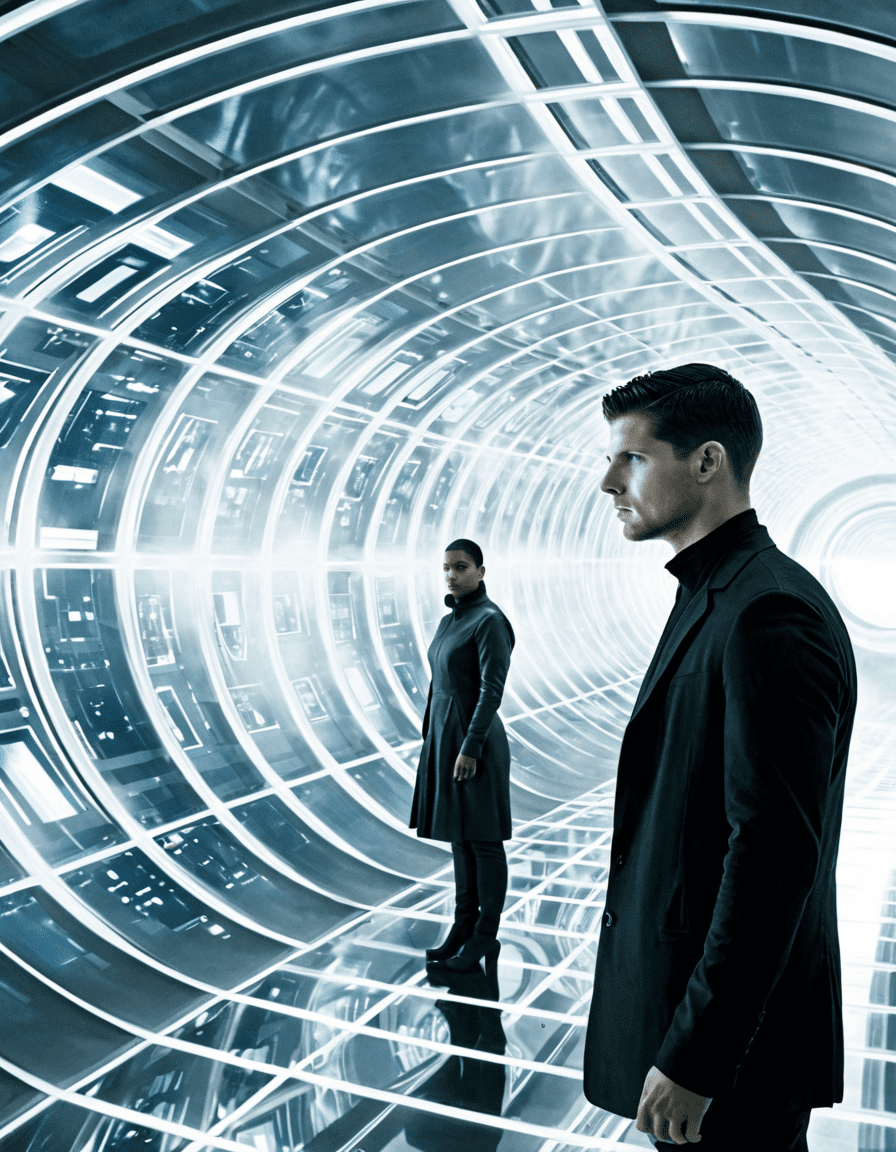Minority Report is not just a film; it’s a riveting exploration of what justice could mean in a high-tech future. Directed by Steven Spielberg and released in 2002, this sci-fi flick has since garnered a cult following for its gripping narrative and philosophical undertones. The film offers a dystopian view of a society where crimes are predicted before they happen, leaving us to ponder the implications of such power. Fast forward to 2026, and the themes of Minority Report resonate even more as we navigate the complex intersection of law, technology, and ethics. Let’s delve into the seven wild cards that define justice in the age of predictive algorithms and surveillance.

7 Wild Cards That Define Justice in the Era of Minority Report
The Minority Report story serves as an engaging vehicle for contemplating the evolution of justice. Each wild card we explore unveils a layer of complexity in our modern-day reality.
1. PreCrime and Predictive Policing
At the heart of Minority Report lies the concept of the PreCrime unit, which uses psychics dubbed “precogs” to foresee criminal actions. Today’s reality echoes this premise with predictive policing tools, like PredPol, which deploys algorithms to anticipate where crimes are likely to occur. While this tech can help deter crime, ethical questions bubble up faster than popcorn in a microwave. Issues like racial profiling and violation of civil liberties make many folks cringe. The film serves as a warning sign, urging us to tread carefully in this tech-heavy world.
2. The Open Season on Privacy Rights
With the rise of surveillance technologies, we find ourselves in a modern-day open season on privacy. From facial recognition software used by police departments to data mining practices employed by corporate giants, our personal lives are being monitored like a hawk. Just as John Anderton (played by Tom Cruise) fights for his autonomy, today’s citizens grapple with safeguarding their rights. The balance between security and individual freedom is as delicate as a house of cards, which leads many to demand stricter regulations to protect their privacy.
3. Numberblocks: The Data-Driven Future of Justice
In Minority Report, quantifying human behavior can lead to alarming outcomes, and we’re witnessing similar trends today. Current judicial systems utilize tools like the COMPAS system—algorithms designed to assess a person’s risk of re-offending based on a mountain of data. Yet, critics argue that relying too heavily on these numberblocks can backfire, skewing justice outcomes. The film paints a cautionary picture of our potential future, prompting urgent discussions around the ethics of data in legal contexts.
4. House of Cards: The Political Backlash Against Surveillance
The political dynamics expressed in the Netflix hit House of Cards resonate with the tension surrounding law enforcement’s use of surveillance. Frank Underwood’s manipulations make it crystal clear that powerful figures can exploit any technology. Likewise, today’s law enforcement agencies are under the microscope for their surveillance practices. In a world buzzing with concern over accountability, the film’s narrative feels painfully relevant, showing how technology can warp governance and public trust.
5. Boxing Day: The Commodity of Human Life
In Minority Report, individuals marked for future crimes are treated worse than merchandise during a Boxing Day sale. Fast forward to today, and consumers also become commodities. Companies like Amazon utilize algorithms during high-traffic shopping days to predict purchasing behavior, effectively reducing people to mere statistics. The ethical implications of such commodification echo the film, prompting society to ask—is our humanity sacrificed on the altar of profits?
6. The Point Break of Ethical Dilemmas
The film’s essence captures the ethical debates swirling around preemptive justice. It’s like catching a tidal wave; police forces worldwide grapple with the morality of using tools such as tasers. The heated discussions around the use of force in current events have revealed deep divisions in public opinion. It’s a point break moment, as civil rights organizations call for necessary reforms that reassess how justice is approached today.
7. Running Point on Criminal Justice Reform
The call for criminal justice reform resonates loudly against the backdrop of Minority Report. The film’s portrayal of punishing individuals before they’ve committed a crime aligns with advocacy from organizations like the American Civil Liberties Union (ACLU). They emphasize the need for preventative measures that don’t sacrifice civil rights. As we look ahead, the lessons gleaned from this prophetic film remain crucial for shaping a fair and just society.

Synthesizing Future Visions of Justice
As we move further into an ever-complex future, the foresight embedded in Minority Report serves as a crucial touchstone for contemporary debates surrounding justice and technology. The wild cards we’ve explored reflect the pressing challenges society faces today. They also signify opportunities for thoughtful reform— a way for technology and humanity to thrive together rather than at each other’s throats.
The specter of Minority Report is not just a tale of caution; it challenges us to strike a balance between efficiency and ethics. In a world where data reigns supreme, we must account for the heart and soul of human rights. In contemplating our contemporary justice system, let’s consider where we’re headed and strive to create a future that echoes our founding principles of fairness and integrity.
In the end, Minority Report urges us to reflect on how close we may be to realizing its exhilarating potential and daunting risks. It’s a cinematic gem that ignites conversations, and as we march on, let’s make sure we’re not stepping onto a path paved with good intentions but leads to troubling outcomes.
For more captivating content exploring films and societal reflections, check out our pieces on Matt Dillon here, or dive into the artistic nuances outlined in our article on the Rule of Thirds here. Curious about what’s trending as we approach significant events? Discover all about the Tyson vs. Paul date here. And if you’re interested in diving into trending discussions, our feature on JJ from the Outer Banks here promises a treat. So, grab your popcorn, tune into these discussions, and let’s keep the love for cinema alive!
Minority Report: Captivating Vision of Future Justice
The Origins of a Sci-Fi Classic
Did you know that Minority Report is based on a short story by Philip K. Dick? This iconic tale was penned in 1956, long before today’s debates about surveillance and free will came to the forefront. Director Steven Spielberg took this intriguing narrative and added his own twist, turning it into a cinematic masterpiece in 2002. Critics often praise the film for its deep moral questions—what happens when we let technology decide our fates? Interestingly, the movie predicted several futuristic elements that are slowly coming to life today, like predictive policing. Just consider how often news surfaces about debates surrounding wilmington nc weather affecting safety measures and community planning!
Tech and Twists: Behind the Scenes
One of the film’s most impressive achievements is its believable portrayal of high-tech devices and environments. The production team worked diligently to craft a universe where technology feels organic. They even imagined unique gadgets, like the interactive advertising that targets individuals based on their profiles—a premonition of our current reality. Given this level of attention, it’s no surprise that many filmmakers now look back to Minority Report for inspiration, using its ideas to drive new stories forward. And speaking of forward-thinking narratives, it’s fascinating that just as the film explores concepts of justice, real-life cases keep arising, like that of a pet alligator Seized for illegal ownership, sparking discussions about law and morality.
Cultural Impact and Iconic Scenes
The film has left an indelible mark on pop culture, from memorable quotes to even parodies. Remember the hilarious Prison Mike skit from The Office? It’s now common to reference the film in discussions about crime and justice. Plus, the concept of “Precrime” has become ingrained in discussions about ethics in law enforcement and predictive analytics. You could even say that Minority Report has taken a seat at the table where serious issues like data privacy are discussed, especially as technology continues to advance. Just think how different things can become—if a single movie can change perspectives, what’ll fond Du lac reporter headlines look like in the next decade?
In short, Minority Report captivates audiences not just with its thrilling plot, but also its foresight and reflection on the principles of justice. The film serves as a cautionary tale and a source of inspiration, urging us to ponder where we draw the line between security and liberty while keeping our collective eyes on the horizon.





